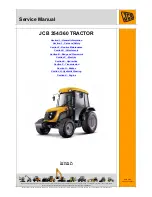
9
TRACTOR & SAFETY POINTERS
The use of good judgment and common sense is necessary by the operator in using this loader. The
front and rear wheels should be set for the widest wheel tread to assure best stability. Use extra caution
when rear wheel weights and tire ballast are added to a loader-equipped tractor. DO NOT ram into
frozen dirt piles, frozen manure piles, ice, etc… with great momentum where sudden shock loads are
encountered. Serious and costly damage may result to both the loader and the tractor.
Do not use a bucket to scrape or as a dozer blade, unless the bucket is tilted so that the bucket stops are
in contact with the boom. A limited amount of leveling may be done, when the loader valve is arranged
with a float control. This will prevent damage to cylinder rods. Never ride in bucket.
Before operating the loader, be sure no one is standing near it. Only one person, the operator, should be
on the tractor. Remain at the controls and under no circumstances leave the tractor unattended with the
bucket in a raised position.
Never lift a person in the bucket or walk under a raised bucket.
Never drive your loader-equipped tractor down a hill that is steeper than 15 degrees. Carry all loads low
and use care on side hills.
Always keep unused PTO shaft clutch levers disengaged.
Keep hands, feet, and clothing away from all moving parts.
Hydraulic oil, under pressure, can cause injury. Be sure that all connections are tight and that all
pressure is relieved before disconnecting any lines.
Care must be taken with your loader cylinders. Nicks, scratches, rust, or other shaft damage can result in
worn packing causing cylinder leakage and subnormal performance.
MOVE SLOWLY
USE COMMON SENSE
BE CAREFUL FOR YOUR OWN SAKE AND THAT OF OTHER PEOPLE
Summary of Contents for 100
Page 1: ......
Page 7: ...8 ...
Page 17: ...18 BASE LOADER ...
Page 18: ...19 HYDRAULIC SYSTEM PARTS DIAGRAM ...
Page 19: ...20 ...
Page 21: ...22 ...
Page 22: ...23 ...
Page 23: ...24 SPECIFICATIONS ...
Page 26: ...28 ...









































